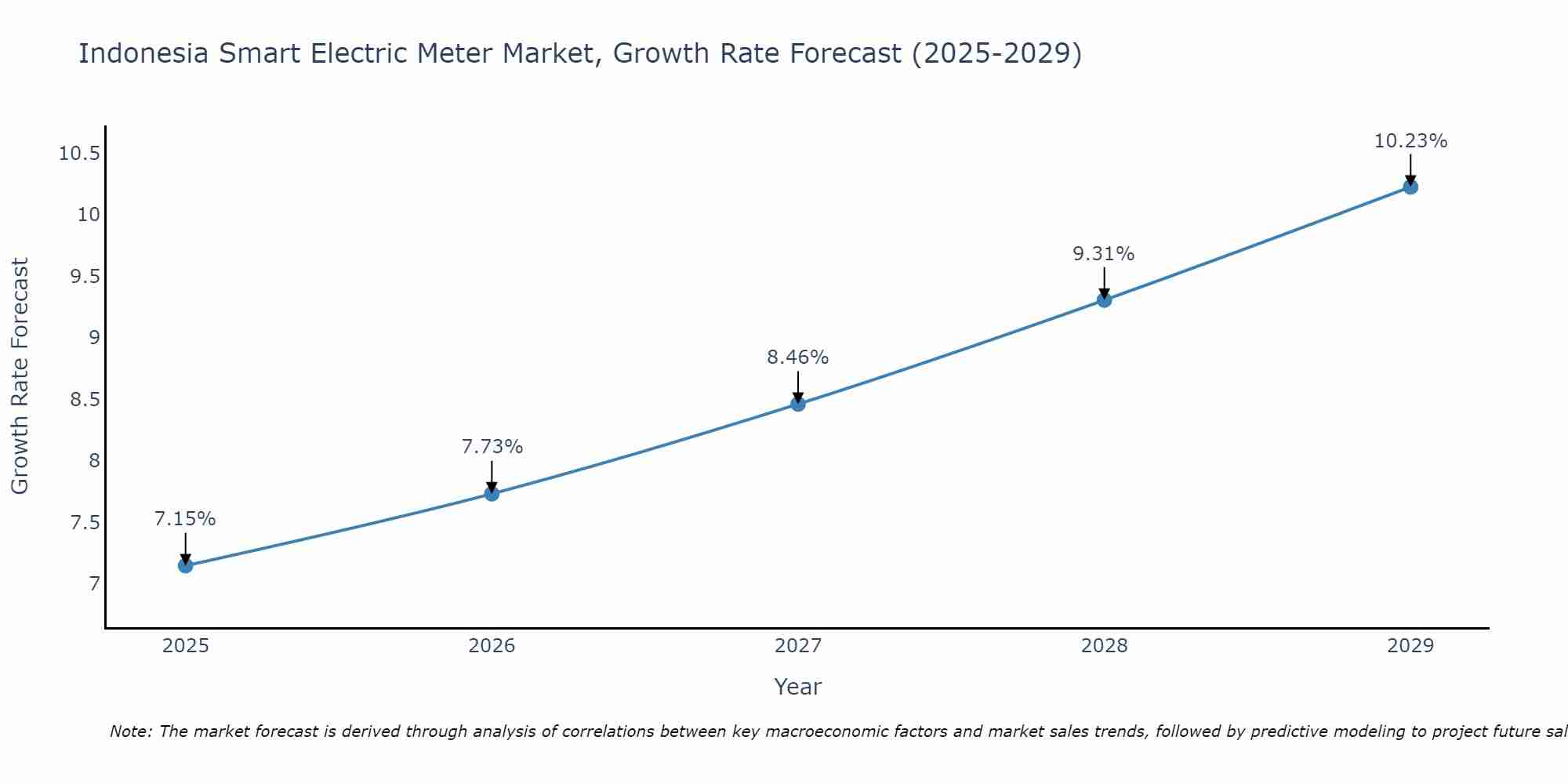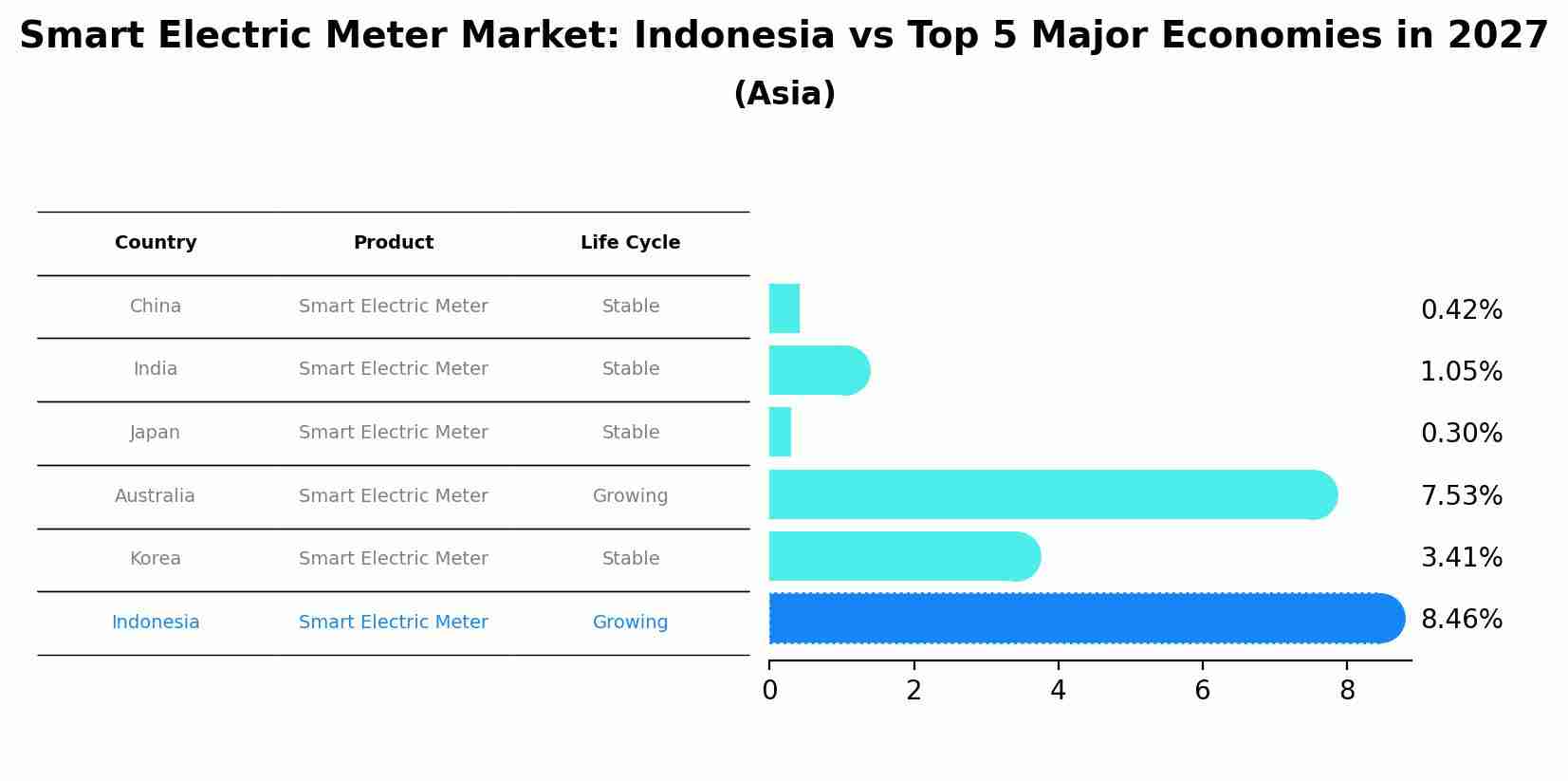Indonesia Smart Electric Meter Market (2025-2031) Outlook | Companies, Trends, Value, Industry, Revenue, Forecast, Share, Size, Growth & Analysis
| Product Code: ETC369328 | Publication Date: Aug 2022 | Updated Date: Apr 2025 | Product Type: Market Research Report | |
| Publisher: 6Wresearch | No. of Pages: 75 | No. of Figures: 35 | No. of Tables: 20 | |
Indonesia Smart Electric Meter Market Size Growth Rate
The Indonesia Smart Electric Meter Market is poised for steady growth rate improvements from 2025 to 2029. Commencing at 7.15% in 2025, growth builds up to 10.23% by 2029.

Smart Electric Meter Market: Indonesia vs Top 5 Major Economies in 2027 (Asia)
By 2027, Indonesia's Smart Electric Meter market is forecasted to achieve a growing growth rate of 8.46%, with China leading the Asia region, followed by India, Japan, Australia and South Korea.

Indonesia Smart Electric Meter Market Synopsis
The smart electric meter market in Indonesia is experiencing significant growth as the country modernizes its energy infrastructure. Smart electric meters offer advantages such as real-time data monitoring, remote meter reading, and improved energy efficiency. With the government`s push for smart grid development and the need to reduce energy losses, the adoption of smart electric meters is expected to rise. These meters enable consumers to manage their energy consumption better and utility companies to enhance their grid management. The market is expected to witness increased investments and partnerships to support its expansion.
Drivers of the Market
The Smart Electric Meter market in Indonesia is experiencing robust growth due to multiple drivers. Firstly, the government`s efforts to modernize the country`s electricity infrastructure and promote energy efficiency are boosting the deployment of smart meters. Additionally, the increasing focus on accurate billing, remote monitoring, and reducing electricity theft is driving utilities and consumers to adopt smart electric meters. Furthermore, the growing awareness of the environmental impact of energy consumption is encouraging the adoption of smart meters as part of sustainable energy management practices.
Challenges of the Market
Challenges in the Indonesia Smart Electric Meter market include the need for infrastructure development to support smart meter installations and data transmission. Ensuring data privacy and cybersecurity in smart metering systems is another major concern. Resistance to change from traditional metering practices can slow down adoption. Additionally, issues related to billing and tariff structures may need to be addressed for a smoother transition to smart meters.
COVID-19 Impact on the Market
The pandemic accelerated the adoption of smart electric meters as utilities and consumers sought ways to manage electricity consumption remotely. With more people working from home, the need for precise energy monitoring and management became evident, driving the smart electric meter market`s growth.
Key Players in the Market
The Indonesia Smart Electric Meter market is witnessing significant growth, driven by the increasing need for efficient energy management and the government`s initiatives to modernize the country`s power infrastructure. Key players in this market include major companies such as PT PLN (Persero), Landis+Gyr, Itron Inc., Siemens AG, and Schneider Electric. These companies are investing in advanced metering infrastructure (AMI) technologies, offering smart meters that enable real-time data monitoring and remote management of electricity consumption.
Key Highlights of the Report:
- Indonesia Smart Electric Meter Market Outlook
- Market Size of Indonesia Smart Electric Meter Market, 2024
- Forecast of Indonesia Smart Electric Meter Market, 2031
- Historical Data and Forecast of Indonesia Smart Electric Meter Revenues & Volume for the Period 2021-2031
- Indonesia Smart Electric Meter Market Trend Evolution
- Indonesia Smart Electric Meter Market Drivers and Challenges
- Indonesia Smart Electric Meter Price Trends
- Indonesia Smart Electric Meter Porter's Five Forces
- Indonesia Smart Electric Meter Industry Life Cycle
- Historical Data and Forecast of Indonesia Smart Electric Meter Market Revenues & Volume By Phase for the Period 2021-2031
- Historical Data and Forecast of Indonesia Smart Electric Meter Market Revenues & Volume By Single for the Period 2021-2031
- Historical Data and Forecast of Indonesia Smart Electric Meter Market Revenues & Volume By Three for the Period 2021-2031
- Historical Data and Forecast of Indonesia Smart Electric Meter Market Revenues & Volume By Communication Technology Type for the Period 2021-2031
- Historical Data and Forecast of Indonesia Smart Electric Meter Market Revenues & Volume By Power Line Communication (PLC) for the Period 2021-2031
- Historical Data and Forecast of Indonesia Smart Electric Meter Market Revenues & Volume By Radio Frequency (RF) for the Period 2021-2031
- Historical Data and Forecast of Indonesia Smart Electric Meter Market Revenues & Volume By Cellular for the Period 2021-2031
- Historical Data and Forecast of Indonesia Smart Electric Meter Market Revenues & Volume By End-Users for the Period 2021-2031
- Historical Data and Forecast of Indonesia Smart Electric Meter Market Revenues & Volume By Industrial for the Period 2021-2031
- Historical Data and Forecast of Indonesia Smart Electric Meter Market Revenues & Volume By Commercial for the Period 2021-2031
- Historical Data and Forecast of Indonesia Smart Electric Meter Market Revenues & Volume By Residential for the Period 2021-2031
- Indonesia Smart Electric Meter Import Export Trade Statistics
- Market Opportunity Assessment By Phase
- Market Opportunity Assessment By Communication Technology Type
- Market Opportunity Assessment By End-Users
- Indonesia Smart Electric Meter Top Companies Market Share
- Indonesia Smart Electric Meter Competitive Benchmarking By Technical and Operational Parameters
- Indonesia Smart Electric Meter Company Profiles
- Indonesia Smart Electric Meter Key Strategic Recommendations
Frequently Asked Questions About the Market Study (FAQs):
- Single User License$ 1,995
- Department License$ 2,400
- Site License$ 3,120
- Global License$ 3,795
Search
Related Reports
- ASEAN Bearings Market (2025-2031) | Strategy, Consumer Insights, Analysis, Investment Trends, Opportunities, Growth, Size, Share, Industry, Revenue, Segments, Value, Segmentation, Supply, Forecast, Restraints, Outlook, Competition, Drivers, Trends, Demand, Pricing Analysis, Competitive, Strategic Insights, Companies, Challenges
- Europe Flooring Market (2025-2031) | Outlook, Share, Industry, Trends, Forecast, Companies, Revenue, Size, Analysis, Growth & Value
- Saudi Arabia Manlift Market (2025-2031) | Outlook, Size, Growth, Trends, Companies, Industry, Revenue, Value, Share, Forecast & Analysis
- Uganda Excavator, Crane, and Wheel Loaders Market (2025-2031) | Strategy, Consumer Insights, Analysis, Investment Trends, Opportunities, Growth, Size, Share, Industry, Revenue, Segments, Value, Segmentation, Supply, Forecast, Restraints, Outlook, Competition, Drivers, Trends, Demand, Pricing Analysis, Competitive, Strategic Insights, Companies, Challenges
- Rwanda Excavator, Crane, and Wheel Loaders Market (2025-2031) | Strategy, Consumer Insights, Analysis, Investment Trends, Opportunities, Growth, Size, Share, Industry, Revenue, Segments, Value, Segmentation, Supply, Forecast, Restraints, Outlook, Competition, Drivers, Trends, Demand, Pricing Analysis, Competitive, Strategic Insights, Companies, Challenges
- Kenya Excavator, Crane, and Wheel Loaders Market (2025-2031) | Strategy, Consumer Insights, Analysis, Investment Trends, Opportunities, Growth, Size, Share, Industry, Revenue, Segments, Value, Segmentation, Supply, Forecast, Restraints, Outlook, Competition, Drivers, Trends, Demand, Pricing Analysis, Competitive, Strategic Insights, Companies, Challenges
- Angola Excavator, Crane, and Wheel Loaders Market (2025-2031) | Strategy, Consumer Insights, Analysis, Investment Trends, Opportunities, Growth, Size, Share, Industry, Revenue, Segments, Value, Segmentation, Supply, Forecast, Restraints, Outlook, Competition, Drivers, Trends, Demand, Pricing Analysis, Competitive, Strategic Insights, Companies, Challenges
- Israel Intelligent Transport System Market (2025-2031) | Strategy, Consumer Insights, Analysis, Investment Trends, Opportunities, Growth, Size, Share, Industry, Revenue, Segments, Value, Segmentation, Supply, Forecast, Restraints, Outlook, Competition, Drivers, Trends, Demand, Pricing Analysis, Competitive, Strategic Insights, Companies, Challenges
- Uganda Precast and Aggregate Market (2025-2031) | Strategy, Consumer Insights, Analysis, Investment Trends, Opportunities, Growth, Size, Share, Industry, Revenue, Segments, Value, Segmentation, Supply, Forecast, Restraints, Outlook, Competition, Drivers, Trends, Demand, Pricing Analysis, Competitive, Strategic Insights, Companies, Challenges
- Australia IT Asset Disposal Market (2025-2031) | Strategy, Consumer Insights, Analysis, Investment Trends, Opportunities, Growth, Size, Share, Industry, Revenue, Segments, Value, Segmentation, Supply, Forecast, Restraints, Outlook, Competition, Drivers, Trends, Demand, Pricing Analysis, Competitive, Strategic Insights, Companies, Challenges
Industry Events and Analyst Meet
Our Clients
Whitepaper
- Middle East & Africa Commercial Security Market Click here to view more.
- Middle East & Africa Fire Safety Systems & Equipment Market Click here to view more.
- GCC Drone Market Click here to view more.
- Middle East Lighting Fixture Market Click here to view more.
- GCC Physical & Perimeter Security Market Click here to view more.
6WResearch In News
- Doha a strategic location for EV manufacturing hub: IPA Qatar
- Demand for luxury TVs surging in the GCC, says Samsung
- Empowering Growth: The Thriving Journey of Bangladesh’s Cable Industry
- Demand for luxury TVs surging in the GCC, says Samsung
- Video call with a traditional healer? Once unthinkable, it’s now common in South Africa
- Intelligent Buildings To Smooth GCC’s Path To Net Zero













